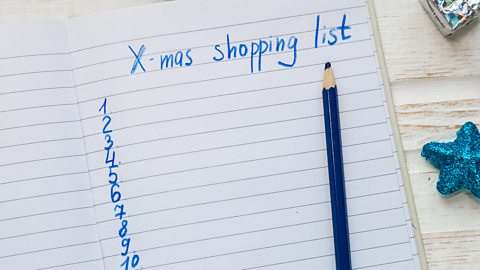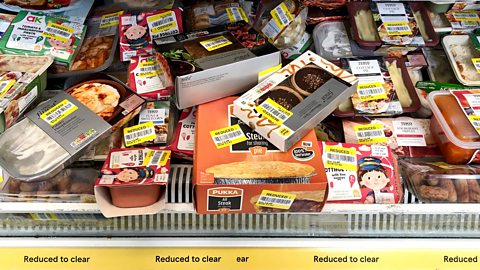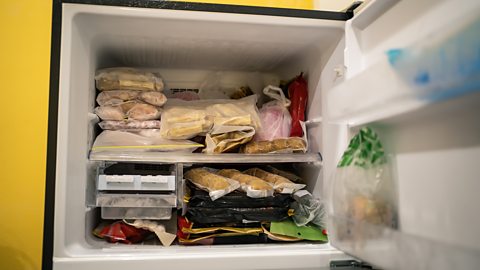Should you shop now to save on Christmas food?
Prepping for the festive season in advance not only spreads the cost, but it could also see you make big savings on food and drink. Here’s how to get started early.

Christmas may look different for many this year. While food inflation has recently slowed down, lots of shoppers are still finding grocery bills difficult to manage. For context, food inflation is currently at 12.2%, whereas in July 2021 it was -0.6%.
So, budgets for the big day will likely be tight. As well as scaling back on gifts, that could also mean rethinking how we shop and eat over the festive season.
No matter what the time of year, planning ahead is key when we’re working to strict food budgets. So, if we start thinking about Christmas now, we may be able to spread the cost and save on our shop.
Start with a budget
Most of us see our food spend spiral over the festive season as we stock up the cupboards ready for the celebrations. In fact, the Bank of England reports that UK households spend 20% more on food and 38% more on alcohol in December compared to the other months of the year.
There are ways to rein in our spending without necessarily having to forego our favourite festive treats, says Citizen’s Advice – but it may take some forward thinking.
“Make a budget and stick to it,” a statement by the charity-run information service advises.
When working out a reasonable spend, it’s important to think beyond obvious expenses to consider any hidden costs like energy consumption.
“Household bills may be higher due to everyone spending more time indoors, children not being at school and guests visiting.
“If you’re buying gifts, think about who you are buying for, what other seasonal costs you have, and how much you can afford to spend. Keep the receipts or ask for a gift receipt for any purchases you make in case there’s a problem with any items or you realise you’ve overspent and need to take things back.”
Write a food list

Once you’ve nailed down your grocery budget, ask yourself which foods are most important to you at Christmas and which you might not miss.
Think about whether you find yourself throwing out the same sorts of uneaten foods each year. Perhaps that all-important lunch just wouldn’t be the same without Christmas pudding, but the tin of festive biscuits you always buy never really gets much attention.
Mitch Lane runs TikTok account Meals by Mitch, where he shares videos of himself preparing meals for four with a strict budget of £5. He points out that we often make certain dishes at Christmas solely out of habit or because it’s what's expected – not necessarily because they’re what we most enjoy.
“Just because it’s traditional to have turkey doesn’t mean we have to. If you’re not bothered by it, get a cheaper cut of meat like a chicken or a gammon joint,” he says.
Thinking more outside the box in this way can come with other benefits, too. “I’ve got a young family and time with them is precious, especially on Christmas Day. So, in previous years I’ve got a pork joint and let it cook through the night in the slow cooker. Then, you wake up on Christmas Day and your meat’s already done. That’s better for me than spending hours preparing a turkey – and it works out cheaper.”
Bargain hunt

Nearly all the major supermarkets have sections on their websites which detail the offers they have for the week. So, before you do your weekly shop, look to see if there are any deals on the items on your Christmas list – you may be able to bag them at a reduced price.
“There are always lots of offers in supermarkets for things like tins of chocolates, biscuits or alcohol in the lead-up to the festive season,” says cookbook author Ciara Attwell, who specialises in family-focused meals. “But they’re often short-lived, only lasting for 10 days or two weeks, so keep an eye out over the next couple of months to make sure you buy things at the right time.
“I’m terrible, though, for opening things like tins of chocolates before Christmas. So, what I have done the last few years is not tell anyone in the family when I’ve picked them up, then I’ve hidden them somewhere outside of the kitchen – say, the loft or under a bed – so I won’t be tempted and no one else will find them, either.”
As well as looking out for planned offers, also remember to seek out yellow sticker items. See a bag of sprouts reduced to 10p? Grab them, prep and parboil them, then stick them in the freezer. Talking of which…
Make friends with your freezer

If you have a freezer, using it wisely could really help you save money on Christmas and allow you to spread the costs over several months.
“If your freezer is small, declutter it now as best as you can so you’ve only got essentials in there,” says Lane. “You can make more room by taking food out of boxes and putting it in freezer bags labelled with the best before date and cooking instructions.”
Meanwhile, Lorna Cooper, author of Feed Your Family For £20 A Week, is a big fan of freezing leftovers, say, from a weekly roast, to use at a later date – including Christmas.
This savvy shopper also looks beyond price tags to work out if she’s getting good value money. “Recently, supermarkets have been selling packs of four baking potatoes. While they’re cheap – around 65p – they’re often tiny. But if you buy a big bag of chunky potatoes they’re much better value and really good for cooking then freezing.”
(As of November 2023, 2.5kg bags of potatoes at budget supermarkets were priced around £1.23. That’s the equivalent of two bags of four small potatoes in terms of price, but equates to much more when you look at weight and quantity.)
While bulk buying and freezing to save in the long term isn’t always possible (it involves an initial outlay and requires freezer space, of course), if you are able to do it for even a few items in the build-up to Christmas, it could really help lower the cost of your festive food shop.
Other Christmas foods that freeze well include butter, meat joints and some cheeses (like cheddar), says BBC Food executive producer Emily Angle.
“Smoked salmon is a luxury item, so it’s worth buying when it’s on offer as it freezes well. Leeks, cauliflower and root vegetables can go in the freezer too. Just chop them how you want to serve, boil for two minutes, then drain and plunge into cold water. Once cool, pack into bags and freeze, then you can cook them straight from frozen.
“Great for the Boxing Day turkey curry, ginger and chillies can be frozen whole. When you need them, allow ginger to thaw for five minutes and grate, and chop chillies from frozen.”
Join forces with friends and family
Teaming up with a friend or family member is a great way to save on your shop. This means you can buy bigger pack sizes (which are often better value) rather than smaller quantities which work out more expensive per portion. Then, split the food and the cost.
“Alternatively, if you’ve got a big family, consider asking all the adults to chip in for the Christmas meal,” says Lane. “So, perhaps someone buys the meat, someone buys the veggies, someone buys the drink, and someone brings the dessert. Then it isn’t such a big outlay for one person or household.”
Don’t succumb to pressure over the festive season
Attwell encourages people to keep perspective to save on both money and stress.
“Remember, Christmas is just one day. People can get worked up about what to feed everyone but, really, it’s a roast dinner – and it doesn’t need to be more than that. Besides, if you’re having family or friends over, they’re not just coming for the food, they’re coming to spend time with you.”
If you’re struggling to afford food, Citizens Advice says, “You may be able to get support from a food bank. You’ll usually need a referral to do this. Your nearest Citizens Advice is a good place to start, or another organisation who are already helping or supporting you, such as a school, charity or children’s centre. Citizens Advice also runs a food bank hotline which can issue food bank vouchers.”
Click here for advice on accessing benefits and services.
Originally published October 2022, costs updated November 2023